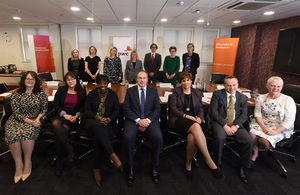Birmingham businesses tell United Nations how gender equality is done
International Development Secretary meets with business leaders and gender specialists to discuss improving women's economic opportunities.

Justine Greening with top business leaders and gender-specialists at the Birmingham office of business advisory firm PwC. Picture: Jas Sansi
International Development Secretary Justine Greening has today spoken to top business leaders and gender specialists in Birmingham about how women’s economic opportunities can be improved around the world, so she can put their views to the United Nations.
Hosting a round table at the Birmingham office of business advisory firm PricewaterhouseCoopers, which included representatives from The Royal Bank of Scotland, Jaguar Land Rover and DLA Piper, Justine Greening addressed gender equality in the workplace head on, gaining an insight into what works and the barriers that remain which are widening the gap between the genders in the workplace.
International Development Secretary Justine Greening said:
From the simple right to open a bank account, to securing a seat in the boardroom, too many women around the world still face significant barriers that stop them from reaching their full potential.
Strong economies need the contribution of everyone, including women. This is about unlocking the potential of half the world’s population. I will take the views and experiences of the business leaders I met in Birmingham today with me to the UN High Level Panel on Women’s Economic Empowerment later this year.
Matt Hammond, regional chairman for PwC in the Midlands, said:
We’re delighted to host this event and give local businesses the opportunity to discuss how to best promote gender equality in the workplace and beyond.
PwC places a great deal of emphasis on providing a progressive working environment for all of our people. We set ourselves ambitious diversity targets and have introduced various initiatives to foster greater inclusion, which have produced tangible benefits for our business, our clients, and the communities we serve.
Our firm has been in the spotlight this week regarding our own approach to gender equality, specifically regarding the uniform policy of one of our suppliers. This has been a stark reminder that there is still more to do on issues of equality in the workplace. It’s about each and every interaction, not just policies.
Justine Greening is a founding member of the first ever UN High Level Panel on Women’s Economic Empowerment. Launched in January this year, this expert group will spearhead a movement to put women’s economic empowerment on the global agenda, using insights gained from events like today’s in Birmingham.
The importance of this work should not be underestimated. A recent McKinsey Global Institute report estimates that if women in every country played an identical role in markets to men, as much as $28 trillion could be added to the global economy by 2025.
The same research found that if every nation only matched the progress of the fastest-improving country in its region, it would add $12 trillion dollars, which represents an 11% boost to global GDP.
The Department for International Development is calling on all businesses to take this survey to help identify both the challenges and successes businesses have experienced in getting more women into work.
Notes to editors
- Despite an additional 250 million women entering the global workforce since 2006, wage inequality continues, with women now only earning what men did a decade ago. (SOURCE: World Economic Forum’s ‘Global Gender Gap’ report)
- In 17 countries, husbands can still legally prevent their wives from working. In 29 countries, women are prohibited from working at night. In 34 countries, women do not have the same inheritance rights as men. (SOURCE: World Bank’s ‘Women, Business and the Law 2016’ report).
General media queries (24 hours)
Email [email protected]
Telephone 020 7023 0600
If you have an urgent media query, please email the DFID Media Team on [email protected] in the first instance and we will respond as soon as possible.